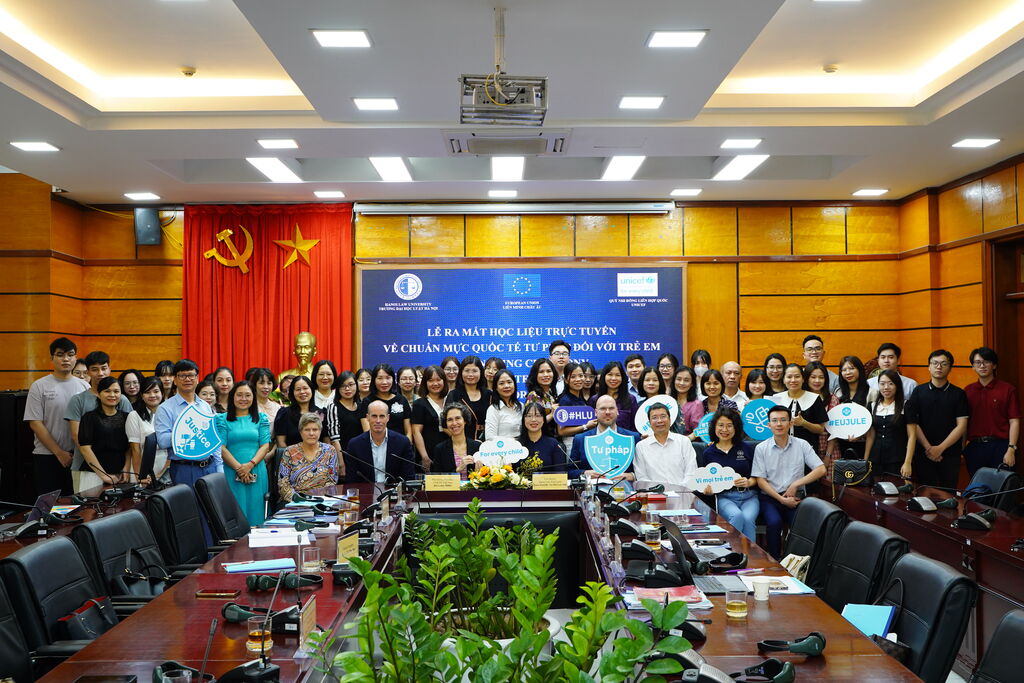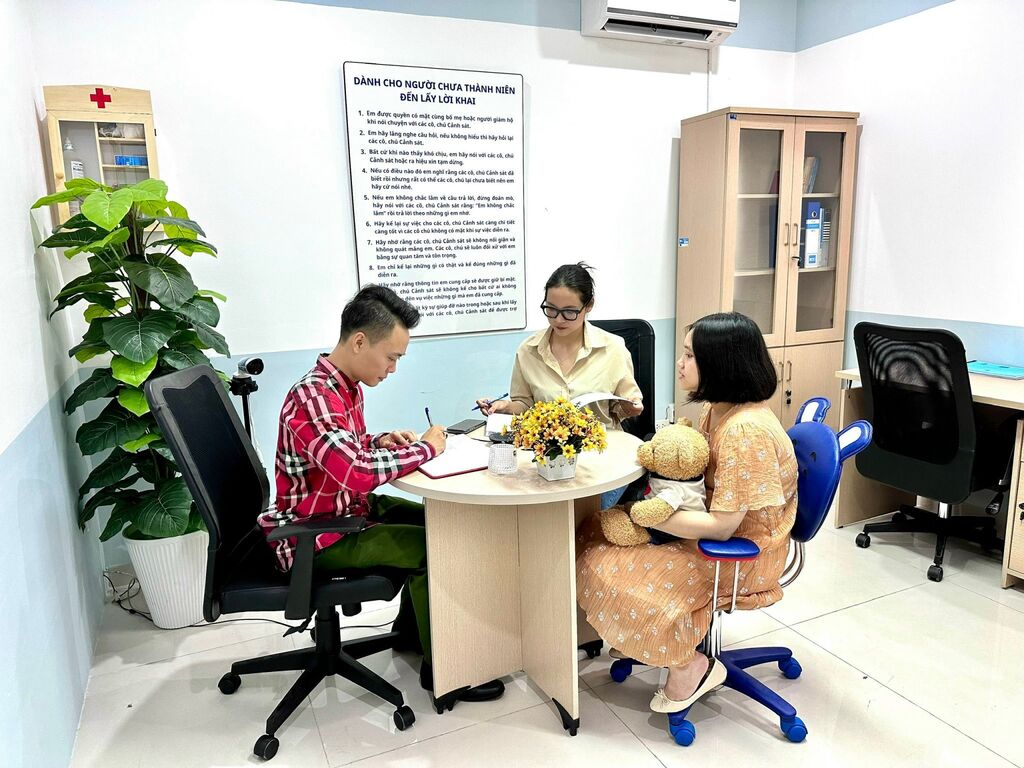 |
| Ms. Silvia Danailov, Representative of the United Nations Children’s Fund (UNICEF) in Vietnam |
After having been put for public comment, the draft Law on Justice for Minors is expected to be submitted to the National Assembly for passage at its upcoming session this October. This is considered a feasible and appropriate solution to further improve the effectiveness of child protection and education in Vietnam in the time to come. Vietnam Law and Legal Forum magazine talks with Silvia Danailov, Representative of the United Nations Children’s Fund (UNICEF) in Vietnam about the draft law.
As far as I know, UNICEF Vietnam has carried out not a few activities to support the Vietnamese Government in protecting children's rights in general and in formulating the draft law on justice for minors in particular. What are your thoughts about the significance of this law in protecting children and supporting judicial reform for juveniles in Vietnam?
Let me begin by expressing my highest appreciation for Vietnam’s remarkable achievements in strengthening justice for children in recent years. The development of the Law on Justice for Minors, once again, demonstrates Vietnam’s strong commitment to the advancement of children’s rights. As the cornerstone of any child-friendly child justice system, this law will provide a solid legal foundation for strengthened protection of children in the criminal justice system, including alleged offenders, victims and witnesses.
For any girl or boy, growing up and developing entails trying out, making mistakes and learning from them. This is a very normal process as the human brain is not fully developed until the early 20s. All children - especially adolescents - often lack the ability to foresee the consequences of their actions or control their emotions and impulses. This holds true for today's teenagers, even though exposure to the internet and social media makes them grow up rapidly and might give them an appearance of maturity. The way we understand their actions and treat them during this phase can have lifelong implications.
Adopting a child-focused approach, fundamentally different from the way adult offenders are treated, the new comprehensive Law on Justice for Minors focuses on rehabilitation, offering individualized support to address the root causes of poor decisions. Because they are still developing, children are generally more receptive to changing their behavior than adults. Educative measures that build positive attitudes and social skills, as well as a sense of responsibility can help them take productive paths to adulthood. Globally, this approach has been recognized to be less costly and more effective at preventing re-offending.
Prioritizing alternatives to criminal proceedings (called “diversion”) and community-based solutions, the Law on Justice for Minors allows children and adolescents to “grow out” of offending in their home community and maintain ties to families and schools. This way children and adolescents are protected from harsh, stigmatizing and punitive treatment that could have long-lasting negative consequences on their physical and mental health, and development.
Here in Vietnam, many children brought before the courts have committed non-violent offenses, such as theft and disturbance of public order. For them, community-based solutions are the most appropriate option - and it does not mean being “soft on crime”. In fact, it requires hard work of the child - encouraging them to confront their issues, holding them accountable for their actions, targeting the root causes of their behavior and helping them choose the right path to becoming productive and law-abiding citizens. This is the best way to ensure the long-term societal cohesion and public safety.
The Law on Justice for Minors is also crucial for protecting child victims and witnesses from trauma when involved in criminal proceedings, ultimately improving the quality of their testimony. It contains detailed guidelines for handling cases involving child victims and witnesses in a child- and gender-sensitive manner, ensuring a fair judicial process and bringing perpetrators to justice. Countries like Indonesia, Laos, Nepal, Croatia, Georgia, and Serbia have already incorporated provisions for protecting child victims and witnesses in their laws on justice for minors.
 |
| Hanoi Law University (HLU)'s launch of the Child Justice E-learning Course (2024)__Photo: HLU |
According to the drafter, the new law aims to innovate and drastically reform laws and policies toward juveniles regarding criminal justice so as to make them conform to international commitments and practices. In your point of view, how will the law help Vietnam achieve this target?
In Vietnam today, the handling of children and adolescents in the criminal justice system is covered by separate provisions and chapters in the Criminal Code, Criminal Procedure Code, Law on Execution of Criminal Judgments, and different sub-laws. This results in fragmentation and does a disservice to children. Over recent decades, many countries globally and in the Asia-Pacific region have moved away from this approach and replaced chapters on “minors” in their general criminal laws with a comprehensive child justice law that stipulates a set of objectives, principles, measures and sanctions, as well as procedures and services specially adapted to children.
In the most recent Concluding Observations on the combined fifth and sixth reports of Vietnam (dated September 19, 2022), the UN Committee on the Rights of the Child urged Vietnam to build upon its significant achievements related to child rights, to bring its child justice system fully into line with the Convention on the Rights of the Child (CRC), especially to adopt a comprehensive child justice law.
The adoption of a comprehensive Law on Justice for Minors will strengthen Vietnam’s compliance with its obligations under the CRC, providing a more unified legal framework for the child justice system by consolidating provisions that are currently covered across multiple laws. This will allow the adoption of a distinct approach to children, fundamentally different from adults, introducing measures adapted to their specific needs, evolving capacities and inherent vulnerabilities and promoting the best interests of a child in contact with the criminal justice system.
I am delighted to see many positive elements in the draft law submitted to the National Assembly in June, which will improve the handling of criminal cases involving children in line with Vietnam’s obligations under the CRC. Some aspects of the draft law can still be further improved by aligning with international standards and best practice.
Firstly, UNICEF applauds efforts to introduce alternatives to criminal proceedings (so-called “diversion”) to redirect children away from the criminal justice system toward community-based rehabilitation. However, it is important to note that because diversion is applied at the pre-trial stage, core procedural safeguards must be respected. Notably, diversion cannot be imposed. It requires the minor’s voluntary consent to be diverted and to all obligations or measures in the diversion plan. To be in full alignment with international standards, the draft law should strengthen this voluntary and consensual aspect by explicitly requiring for the child’s consent to both the diversion process and obligations in the diversion plan.
Secondly, diversion should not involve any form of deprivation of liberty. As such, placement in reform school should be a penalty rather than a diversion measure.
And finally, juvenile offending is generally related to complex social issues in the living environment of the child. As shown by international best practices, effectively addressing these issues requires the specialist knowledge and skills of dedicated staff with professional social work capacities. UNICEF strongly recommends the establishment of a more professionalized social service workforce, especially a network of social workers at provincial and district levels, and social work collaborators at the commune level.
 |
| Police students practicing child friendly interview techniques at the People's Police Academy (PPA)'s Child Friendly Investigation Room (2023)__Photo: PPA |
UNICEF has been accompanying the Vietnamese authorities in several projects on child protection and support for judicial reform for juveniles in the country. Could you say something about your outstanding projects over the past years as well as their outcomes?
UNICEF has been present in Vietnam to support the advancement of children’s rights since 1975. Our support to strengthen justice for children was intensified with the approval of the very first project on Friendly Justice System for Minors between the Ministry of Justice and UNICEF in 2006. Since then, UNICEF has been working closely with dedicated partners to improve children’s access to justice - especially the Ministry of Justice, Ministry of Public Security, Ministry of Labor, Invalids and Social Affairs, Supreme People’s Court, Supreme People’s Procuracy, and the Vietnam Lawyers Association.
Over the years, UNICEF has been supporting national partners to learn more about international standards and valuable lessons from other countries, especially those sharing similarities with Vietnam, to inform efforts to improve the legal and justice systems for better protection of girls and boys in contact with the law. UNICEF also helped equip thousands of new and frontline law enforcement and justice officers, legal aid/lawyers and welfare officers with specialized knowledge and skills to conduct justice proceedings in a child- and gender-sensitive manner and deliver high-quality, age-appropriate legal aid and other services to children.
Through our trusted and long-standing partnership, national authorities have institutionalized successful approaches to produce impactful results for children at national scale. The significant achievements in child justice were acknowledged in the most recent Concluding Observations on Vietnam of the Committee on the Rights of the Child. The Committee especially commended Vietnam for the introduction of diversion measures in the Law on Handling of Administrative Violations, child-friendly procedures in the Criminal Procedure Code, expansion of legal aid child beneficiaries under the Law on Legal Aid, as well as the roll-out of 40 Family and Juvenile Courts as specialized children’s courts, just to name a few.
The Law on Justice for Minors, once approved, will mark a significant milestone. We look forward to our continued collaboration with key partners to ensure that the law on paper becomes a law in practice, thereby increasing access to justice for girls and boys under the age of 18 across Vietnam.-









